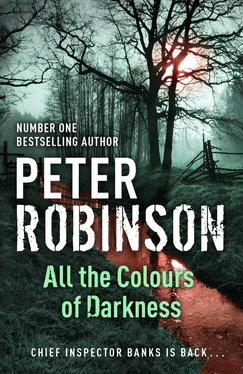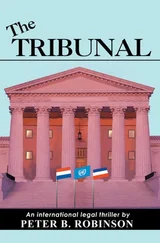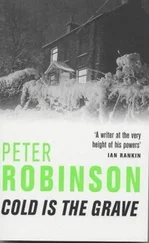“Agreed,” said Banks, finishing off his beer and standing up. They walked to their cars, still parked outside Laurence Silbert’s house, where a few die-hard reporters lingered on, and said good night to PC Walters, then to each other. Banks watched Annie drive away in her old Astra, then started the Porsche and headed for Gratly. Cameras flashed in his rearview mirror.
It felt like weeks since Banks had been home, but it had only been a couple of days. One night away, he realized. Only one night with Sophia. Even so, his isolated cottage greeted him with a silence that felt even more profound and oppressive than usual.
He turned on the orange-shaded lamps in the living room. There was only one message on the answer phone: his son Brian informing him that he was back in the London flat for a couple of weeks if Banks happened to be down there and fancied dropping by. Brian had recently moved into a very nice, if very small, flat in Tufnell Park with his actress girlfriend Emilia, and Banks often visited them when he was in London with Sophia. He had even taken Sophia there for dinner once, and she and Brian and Emilia had got along well — mostly because Sophia knew and liked many of the same bands as they did. For a while, Banks had felt a bit old and out of it, like a boring old sixties fart, even though he listened to a lot of new music himself. Still, as far as he was concerned, for great rock you couldn’t beat Hendrix. Dylan, Floyd, Led Zep, The Stones and The Who.
A dark turquoise afterglow shot with orange and gold remained in the sky over Gratly Beck and the valley below. Banks gazed at it for a few moments, drinking in the beauty, then closed the curtains and went through to the kitchen for a glass of wine. He realized he was hungry, hadn’t eaten since breakfast, unless he counted that custard cream at the meeting. The only thing remotely resembling a meal in his fridge was a carton of leftover goat vindaloo from the local takeaway, and the remains of a naan wrapped in foil. But curry wouldn’t go with the red wine he was drinking. Besides, it had been in the fridge too long. Instead, he dug out some mature cheddar, checked the bread for green spots and, finding none, made himself a toasted cheese sandwich, which he carried through along with his wine to the entertainment room.
He felt like listening to something mellow but sensuous, and, thinking about new music, he put on a Keren Ann CD. The distant, distorted guitars and eerie, hushed vocals of “It’s All a Lie” that filled the room were perfect. Just what he wanted. He lounged back in the armchair and put his feet up, mind ranging over what he knew of the Hardcastle-Silbert case so far.
It resembled a textbook murder-suicide, a crime of passion distinguished by extreme violence and overwhelming remorse. From what Banks could remember of the study he had read in Geberth’s Practical Homicide Investigation, homosexual murders were often characterized by extreme violence directed toward the throat, chest and abdomen. In this case, the larynx had been shattered by a powerful blow. Ge-berth said the throat was a target because of its significance in homosexual lovemaking, and the violence so extreme because both parties are sexual aggressors. That sounded a bit politically incorrect to Banks, but he didn’t really care. He hadn’t invented the theory.
He wanted to know what Laurence Silbert had been doing in Amsterdam, a place as famous for its Red Light district and permissive attitudes to sex as for anything else. Perhaps Edwina would be able to help tomorrow? Her sadness over the loss of both Laurence and Mark seemed genuine to Banks, as did her absolute shock at the idea that Mark could have had anything to do with it.
Banks also wondered if Mark Hardcastle’s trip to London with Derek Wyman had played a part in the events that followed, however innocent it might have been. Was it so innocent? Had Laurence Silbert found out? Had he flown into a violent, jealous rage? Was that how the argument that led to both their deaths had started? Banks and Annie would talk to Derek Wyman in the morning and perhaps find some answers to those questions, too. It was Sunday, but there would be no time off for Banks, not when he’d come all this way and given up his weekend with Sophia. A DCI didn’t get paid overtime, nor did Annie, a DI, so the best he could hope for was a little time in lieu, then maybe he and Sophia could manage a long weekend in Rome or Lisbon. That might just make up for missing the dinner party.
It was half past eleven when the phone rang, and Keren Ann had long since given way to Richard Hawley’s Cole’s Corner, another late-evening favorite.
Banks picked up the extension beside his armchair. It was Sophia, and she sounded a little tipsy.
“How did it go?” Banks asked.
“Great,” she said. “I did Thai and everyone seemed to like it. They just left. I thought I’d leave the dishes. I’m tired.”
“I’m sorry I’m not there to help you,” said Banks.
“Me, too. Just sorry you’re not here, I mean. Is that Richard Hawley you’re listening to?”
“It is.”
“Yuk. So that’s what you get up to when I’m not around?”
Sophia didn’t like Richard Hawley, called him a yob from Sheffield with pretensions to easy listening. Banks had once countered by dismissing Panda Bear, one of her new favorites, as watered-down Brian Wilson with cheap sound effects. “A man has to have some vices,” he said.
“I can think of better ones than Richard Hawley.”
“I was listening to Keren Ann earlier.”
“That’s better.”
“I think I’m in love with her.”
“Should I be jealous?”
“I don’t think so. But I had a drink with Edwina Silbert this evening.”
“Edwina Silbert! From Viva?”
“One and the same.”
“My God, what’s she like?”
“Interesting. She’s definitely got charisma. And she’s still a very beautiful woman.”
“Should I be jealous of her, too?”
“She’s eighty if she’s a day.”
“And you prefer younger women. I know. How did you get to meet her?”
“She’s the mother of one of the victims. Laurence Silbert.”
“Oh dear,” said Sophia. “The poor woman. She must have been absolutely devastated.”
“She managed to put a brave face on it for a while,” Banks said, “but yes, I think she was.”
“How’s the case going?”
“Slow, but we’re making some progress,” said Banks. “Chances are it might lead in the direction of London before too long.”
“When? I’ve got a really busy week coming up.”
“I’m not sure. It’s only a possibility, but I might have to check out a pied-a-terre in Bloomsbury. At the very least we should be able to manage lunch or something. More important, what about next weekend. Are you still coming?”
“Of course I am. But do promise me you’ll be around.”
“I’ll be around. Don’t forget, I’ve got tickets for Othello next Saturday night. The Eastvale Amateur Dramatic Society.” He didn’t want to tell her that the case was connected to the theater; he had got the tickets well before Mark Hardcastle’s suicide, well before he had ever heard of Hardcastle.
“An amateur production of Othello,” said Sophia with mock enthusiasm. “Wow! I can hardly wait. You sure know how to treat a girl well, Detective Chief Inspector Banks.”
Banks laughed. “Drinks and dinner before at one of Eastvale’s finest establishments, of course.”
“Of course. The fish and chip shop or the pizza place?”
“Your choice.”
“And after...?”
“Hmm. Remains to be seen.”
“I’m sure we’ll think of something. Don’t forget your handcuffs.”
Banks laughed. “I’m glad you called.”
Читать дальше












